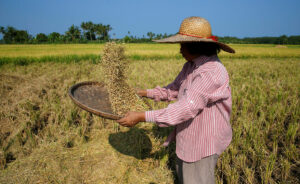THE departments of Agriculture (DA) and Agrarian Reform called on government agencies and government-owned or -controlled corporations (GOCCs) to procure palay (unmilled rice) directly from farmers in compliance with their legal obligations.
In a joint briefing, the two departments cited the importance of harnessing government procurement to support farmers and ensure they obtain fair prices for their grain.
The briefing was convened to discuss Executive Order (EO) 100, which directs officials to establish regional floor prices for palay, and EO 101, which pushes for the full implementation of the Sagip Saka Act to boost enterprise development among farmers and fisherfolk.
Republic Act No. 11321, or the Sagip Saka Act, requires government agencies and GOCCs to procure agricultural and fishery products directly from accredited Farmers and Fisherfolk Cooperatives and Enterprises.
The Sagip Saka process exempts procuring entities from public bidding rules.
“Kinakailangan kung mamimili ng mga bigas na gagamitin para sa mga feeding program, disaster response, at iba pa, kinakailangan itong magmumula sa palay na itinanim ng mga kamay ng magsasakang Filipino (When buying rice for feeding programs, disaster response, and other government initiatives, it should come from palay grown by Filipino farmers),” Agrarian Reform Secretary Conrado M. Estrella said at the briefing.
EO 100 also tasks the DA and a yet-to-be-formed steering committee to set and adjust the palay floor price per region.
While specific guidelines are still being developed, the floor price is expected to align with current National Food Authority regional price levels, which range from P17 to P23 per kilo for fresh palay and P23 to P30 per kilo for clean, dry palay.
Sen. Francis Pancratius N. Pangilinan, principal author of the Sagip Saka Act, said the two EOs will help local farmers and consumers.
“These measures are timely lifelines for Filipino farmers, fisherfolk, and consumers amid surging fuel costs and successive calamities affecting quake- and typhoon-affected provinces,” Mr. Pangilinan said in a statement.
The DA will also set up Sagip Saka Desks in its regional field offices to register farmers and fisherfolk to qualify them to sell to government agencies.
Farmer groups raised concerns over the limitations of the executive orders.
“EO No. 100 covers only government procurement of palay, but without a substantial increase in the government’s procurement budget, the state can purchase only 2–4% of the harvest, leaving approximately 95% of our palay under the control of private traders and trader-importers,” Samahang Industriya ng Agrikultura Executive Director Jayson H. Cainglet said in a statement.
Agriculture Secretary Francisco P. Tiu Laurel, Jr. said the goal is to increase government procurement to have a better influence over prevailing rice prices.
“Ang target natin next year is 20% ang government procurement (Our target next year is 20% of the rice trade accounted for by government procurement). We will have new facilities, silos, that will be more than double our capacity to store (rice),” Mr. Laurel told reporters. — Vonn Andrei E. Villamiel
